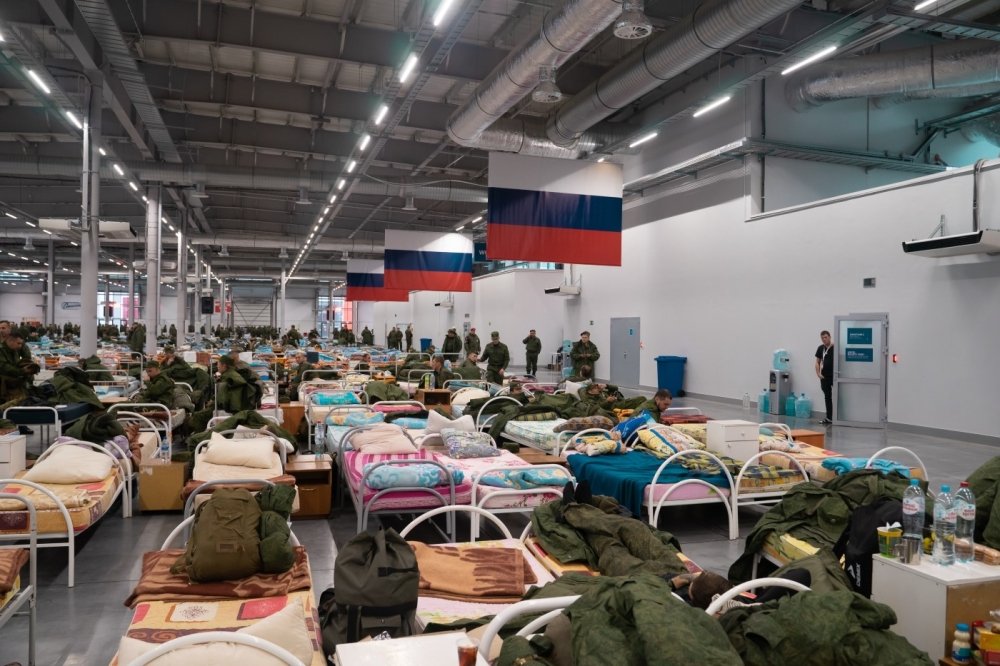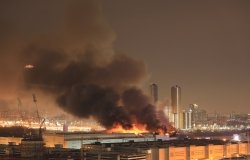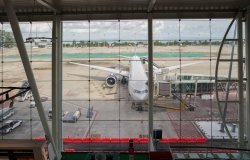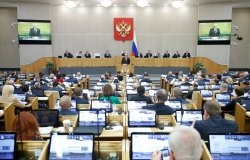
A blog of the Kennan Institute
The Russian War Machine

As the war in Ukraine enters its third year, fatigue has set in in all the countries directly or indirectly involved. It is difficult for politicians to decide to increase military spending: there are always domestic problems that voters prioritize. It is difficult for companies to increase arms production quickly. In both Ukraine and Russia, there is an obvious shortage of people willing to fight.
However, Russia’s political and economic system is far better prepared for war. Its politicians are independent of the electorate’s sentiments and can continue to fulfill their delusional fantasies, working to destroy Ukraine and create a permanent threat to Europe. Corporations, having received military contracts and freed from competition from imports, are eager to join the arms race, seeing it as an opportunity to increase their profits.
Russians are beginning to see the war as something that is pointless and dangerous to resist. Despair prevails, and we will not see a Russian “march on the Pentagon,” a 1967 event during which protesters against the Vietnam War confronted military police in Washington, D.C. Russia’s Defense Ministry is capable of recruiting hundreds of thousands of contractors a year. This will allow Putin to keep up the military pressure on Ukraine, which is now experiencing a shortage of weapons, ammunition, and soldiers.
However, Putin will also be happy with the option of “winning” through a ceasefire agreement that would allow him time to regroup for the next attack. This would ease the burden of mobilization on the population without reducing the military spending that fuels weapons manufacturing.
War as Incentive
Putin is now interested in making the war permanent, notes political scientist Nikolai Petrov. The war justifies the complete elimination of political competition, deprives the economic elites of their autonomy, and strengthens the influence of the security apparatus. The spectacular assassination of Yevgeny Prigozhin, a private military commander who started a mutiny, and the slow assassination of Navalny in prison have eliminated Putin’s most dangerous rivals.
The war has become a chance for many people to significantly improve their standard of living. The monthly salary of a contract soldier is around $2,300, more than four times the median salary in Russia. The worse a person’s life is, the easier it is to persuade them to go to war. According to official accounts, the army recruited about half a million contract soldiers in 2023.
The rate of recruitment of contract soldiers in 2024 is likely to be half that. The army has already picked the low-hanging fruit in 2022–2023 by mobilizing large numbers of prisoners and people from poorer regions. The Russian military expect this to be enough to dictate the situation on the front, especially given the problems of rearmament in Ukraine, the slow growth of military production in Europe, and the difficulties of supplying Ukraine with American weapons.
Serious incentives have also been created for those employed in the military-industrial complex, which accounted for most of last year's GDP growth. The factories working on army contracts have raised wages sharply and increased hiring, and continue to recruit new workers. Many civilian industries have reoriented to meet the army’s needs. As a result, the total number of beneficiaries of the war, who might therefore be interested in its continuation, may reach 15–20 percent of the population.
A Soviet Model: Improved Edition
Putin has created an improved model of the Soviet system. Back then, the army was supplied by sluggish state enterprises. Now there are many private companies operating with market incentives. Capitalist production is more efficient than a planned economy, and autocracies find it much easier to wage war than democracies. Modern Russia, which combines capitalism with a regime of personal power, is very well adapted to war.
Of course, Putin is not free from the many difficulties that come with waging wars of conquest. The main drawback is ordinary Russians’ reluctance to die or to kill. There is a growing movement of relatives of those who have been mobilized. Relatives of the dead and missing are trying to get information from officials about their loved ones.
Over the course of 2023, according to the Chronicles project, an independent polling outlet, the share of those in favor of continuing the war at all costs has fallen from 22 percent to 12 percent, while the share of those opposed to ending the war if Putin's stated goals are not achieved has fallen from 47 percent to 31 percent. For the first time since the start of the full-scale invasion, there are more supporters of such a decision than opponents. According to the Russian Field poll, the number of Russians who want to end the war is almost an order of magnitude greater than the proportion of those who want to achieve total victory.
More than half of Russians cannot formulate a clear position toward their country’s war. On average, respondents are more concerned about health and income than war. The majority do not want to know anything about the war, do not want to receive any news about it, do not want to think about it. Powerlessness, apathy, depression, unwillingness to do anything on their own—these are the most widespread feelings among Russians when it comes to war and politics.
War fatigue is fueled by the accumulating inflation that is overwhelming the growth of Russians' real incomes.
Putin Needs to Feed His War Machine
The median Russian voter would simply like to return to some pre-war normalcy. At the same time, 56 percent of respondents fear that if Russia withdraws its troops from Ukrainian territory, Ukrainian troops will enter Russia. In addition, 54 percent are sure that the end of the war will not affect their lives at all, as if the war were taking place in some parallel reality.
Russian war fatigue makes the ceasefire scenario more attractive to Putin. At the same time, the incentives for him to end the war are not strong. Putin may well continue the war, counting on the weakening of Ukraine and its supporters. However, the main thing is that none of these scenarios would mean stopping the military production pipeline, reducing military spending, or liberalizing domestic politics. It would only be a tactical pause.
With Ukraine, Putin knows how to play the long game, waiting for the right moment to strike. Therefore, a permanent state of war, exhausting and persistent, is with us for a long time. Do not think that you can appease the aggressor. The feeling of satiety will not last long. The Russian war machine is assembled and ready to grind for a long time to come.
The opinions expressed in this article are those solely of the author and do not reflect the views of the Kennan Institute
See our newest content first.
Subscribe to receive the latest analysis from the Russia File
About the Author

Boris Grozovski
Journalist and public educator; author of Telegram channel EventsAndTexts

Kennan Institute
The Kennan Institute is the premier US center for advanced research on Russia and Eurasia and the oldest and largest regional program at the Woodrow Wilson International Center for Scholars. The Kennan Institute is committed to improving American understanding of Russia, Ukraine, Central Asia, the Caucasus, and the surrounding region though research and exchange. Read more










